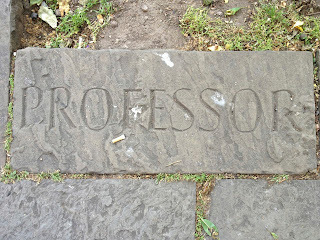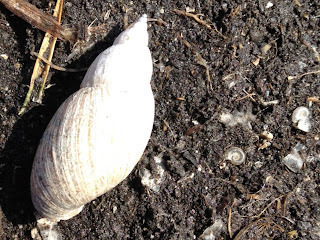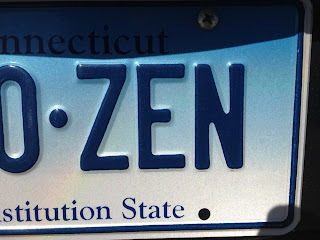sabbatical
So, how’s the sabbatical going?
This is the third time in my life that I have taken a sabbatical. On average, I’ve taken one about every eleven years. My first sabbatical was from a position as a campus minister, and I used it to begin graduate school. There was no obligation for me to return to that position afterwards, and I wound up not returning. Instead, I continued with grad school and eventually became a professor. My second sabbatical, which I’ve written about here, was after I first earned promotion and tenure. This current one might be my last.
Sabbaticals are a great idea. I wish everyone could have sabbaticals. Some countries have long service leave, allowing those who stick with a job for a given number of years to take some time of rest and renewal. Etymologically, “sabbatical” is supposed to be a time of rest. In most cases today, I’m not sure it still means that. Some companies offer leave for study and upskilling, which is great, but it’s usually about coming back to work as a more efficient worker. Sabbaticals seem to be more and more about efficiency. The committee that reviewed my sabbatical request sent me a letter letting me know that my sabbatical was approved, and that they expected me to write and publish the things I said I’d like to work on. If memory serves, there was nothing in there like “remember, this is mostly about rest and restoration, so don’t neglect that.”
And I find that my first impulse on sabbatical has been to use time away from the office and the classroom to catch up on all the things that get neglected when I’m working hard at being a teacher. Inbox zero is a tempting goal, even if the only way to achieve it is to mass delete emails. In other words, I am tempted to use time away from the office to catch up on things that I should have done at the office if I weren’t so damn busy.
We impose work on ourselves. Productivity is the watchword. Our discipline has monastic roots. We still wear the robes and still have our cells (offices), but the daily office of readings, the hours of resting and praying are a thing of the past. We dress like monks but we still punch the clock like everyone else. It feels like we’ve lost something big, and we’ve told ourselves the loss was freedom from outdated antiquity. I’m not sure that’s true.
A few years ago I took my students to visit a monastery in Greece. The sisters there told my students about their lives, and about their daily work and prayer. They wake up in the middle of the night and gather in their little chapel to pray, then return to bed for more sleep. When they wake up, they pray together again, and then throughout the day they return to the chapel to pray and read and sing. In between that, they do the things that make their life together possible: they grow food, harvest it, store it, prepare meals, and eat them together. Clothes get washed, floors get swept, and the work of caring for the needy in their community goes on at a steady pace. Not with breakneck urgency, but at a pace that can be maintained—that has been maintained—for centuries.
When my students heard all this, one of them asked with a look of exhaustion, “When do you take a break?” The sister looked at her with some confusion, and replied “Take a break from what? Our lives are lives of leisure.”
For most of us, including teachers at most of our nation’s small colleges, our lives are not so much lives of leisure but of busy-ness and constant work. One of the appeals of teaching used to be the possibility of leisurely conversations with students and colleagues. We spoke in lofty terms of “the life of the mind,” and of a “great conversation” that included both the living and the dead who left their words for us to contemplate. The trade-off was we teachers would accept low pay in exchange for a long tenure that included time to reflect so that we could both model good practices and teach “sound learning, new discovery, and the pursuit of wisdom.” (That line is from theBook of Common Prayer.)
The last decade feels like it has been a decade of increasing urgency at the expense of contemplation, greater push for efficiency at the expense of conversation, the replacement of teaching with instruction, the rise of software to “manage” courses for teachers (and to do homework for students), the gathering of data that will satisfy the professional accreditors.
I have more to say about this, but I’m going to stop here for now because I’m going to go do something else. Or rather, I’m going to take a little while to do very little, intentionally. One of my practices during my sabbatical has been to pay close attention to what is right before me. I do this by sketching and by writing, not with the intention of publishing my essays or of becoming a great artist, but rather in order to be more attentive. I think that’s a good model for my students, and hopefully it helps me to rest and to return as a more attentive and more caring teacher. Because teaching is not (for me, at least) about handing over information but about fostering lives of contemplation, conversation, and commentary.
Back To Work
I've been on sabbatical for the last academic year, and it has been a gift.
I've done a lot of writing (I think I've averaged about 750 words a day, which may not sound like much, but it is) and a lot of reading (roughly a half a book a day for fifteen months) and a lot of traveling (visited five countries; had one writing fellowship on the west coast and one NEH study fellowship on the east coast; read and wrote at a writer's conference in Vermont; attended a handful of other conferences; and a whole lot more. I lived out of my suitcase for the first two months of this summer.)
In other words, my sabbatical hasn't been idle time. Quite the opposite.
But now I'm ready to get back to work. To the work I feel called to do, that is. All the work I've done for the last year has been aimed at a particular purpose: to make me a better teacher.
Those Who Can, Teach
No doubt you've heard it said that "those who can, do; those who can't, teach." Anyone who has tried to teach well knows exactly why that saying is false.
In one small way, it can sometimes be true: it may be that the teacher lacks the physical capability to perform the tasks she teaches. But if she teaches them, she must understand them at least as well as those who perform them. Good athletic coaches illustrate this idea well: a man may be a brilliant football coach well after he's too old to survive being tackled; a woman may understand her sport far better after her body will no longer allow her to participate in it.
But in each case it is obvious that the teacher has some mastery that is greater than the bodily capacity to do the activity.
To paraphrase Aristotle: the craftsman knows something, but the one who teaches the craftsman must know even more. My sabbatical has been a chance to deepen precisely the kind of knowledge I need to be a good teacher.
Be The Change You Want To See In Your Students
I can't speak for all teachers, but I find that it is not enough to know only as much as I plan to teach. When I teach a course in philosophy, philology, theology, ecology, or history I must become a student of that discipline myself.
This is one of the reasons why humanities professors are always reading and writing. It is not enough to tell the students what we know. As Plutarch put it, "The mind is not a vessel to be filled but a fire to be kindled." My job is not to impart information; my job is to make students. My job is the work of conversion, of helping people become what they were not, of facilitating the habit of learning throughout one's whole life.
To put it negatively, my job is to avoid being a hypocrite. More positively, my job is to be an example of the kind of change I wish to see in my students. And this is why sabbaticals are so important. They are not a reward for service, a respite from the work of teaching. They are a chance to immerse oneself in the life of the student again, to strengthen the scholarly habits. Sabbaticals make better teachers.
Looking Forward To My Real Work
 Recently I was having a drink with some other professors in my field as we sat on a hotel rooftop in Athens. Several of them described the tricks they've come up with to minimize grading and teaching, so that they can spend more time on their "real work." This "real work" turned out to be their research.
Recently I was having a drink with some other professors in my field as we sat on a hotel rooftop in Athens. Several of them described the tricks they've come up with to minimize grading and teaching, so that they can spend more time on their "real work." This "real work" turned out to be their research.Kvetching in bars is a popular pastime for many professions, so I won't hold those words against them. And I can't claim to know what the difficulties of their lives are like, nor how hard it is for them to manage the stresses of the job market (neither of them has a stable position). And both of them may in fact be excellent researchers who are producing books and articles the world needs.
But it made me sad to hear that things have so fallen out for them that they have come to regard teaching as an impediment to their real work. I love teaching, and I'm grateful for the privilege of spending time with books and pens and bright young minds. I love the way the books and pens become tools for working out our life together.
Some of my friends have been ribbing me about having to go back to work after a yearlong sabbatical. I'm sure it will present some challenges, and I'll have less control of my schedule. But honestly, I've missed the classroom. This year has been like time in the shop, taking apart the engine and replacing worn parts, topping off the fluids, recharging the battery. As the sabbatical comes to a end, I find I'm eager to rev the engine and step on the pedal. I'm looking forward to seeing my older students, and to meeting the new ones. I'm looking forward to engaging in the lofty work I've been called to, of helping young people think in ways they had not yet imagined. I'm looking forward to seeing their eyes light up as they read Plato and Kant and Emerson, to hearing their challenges, to seeing what happens when they, too, step on the pedal and squeal the tires. I can't wait to get back to work.
*****
If you're curious: The Plutarch quote, above, comes from near the end of his "On Listening To Lectures." This is my rough translation, which I think comes pretty close to what he says.
So, How's The Sabbatical Going?
Sabbaticals and Long Service Leaves
 |
| Sabbaticals can be seasons of letting dry husks bear new life. |
Most jobs in the United States don't offer sabbaticals, but I'm fortunate enough to have one that does. Sometimes my kids chide me for choosing a job with relatively low pay, but self-regulated time is something money can't easily buy. I think I chose my career pretty well.
I say "self-regulated time" because my sabbatical isn't early retirement or a long vacation. My job as a college professor has three basic components: teaching, scholarship, and service. A sabbatical frees me from the first of those components, and from parts of the third. More precisely, it frees me from the daily tasks of teaching and service, but I expect that at the end of this year I will be a better teacher because I've had time to do research and to tear down and rebuild some of my classes. And any college capable of taking the long view knows that faculty who take sabbaticals can render better service over the long haul.
What I've been doing
To the casual observer it probably looks like I've spent a lot of time in coffee shops and airports, and not much else. For the last three years I've devoted myself to teaching and service, giving only a little of my time to scholarship. So when I began my sabbatical my scholarly life felt like deep waters pent up behind a strained dam. Over the last few years I've sketched out five books and seven articles and book chapters. Over my sabbatical I hoped to get maybe one book and a couple of articles done. That may not sound like much, but it's fairly ambitious, given how much time it takes to do the research and to write well.
Since my job description breaks down into the three parts I mentioned above, let me say a few words about what I've been doing this year in each of those areas.
Writing: As for academic writing, so far, I've completed one book (on brook trout), and made significant progress on two others (both on the philosophy of religion). Once I get them done, books four and five are ready to go, too. I've submitted one book chapter for someone else's book, and I'm about to submit another. I've written a few book reviews for popular and scholarly journals, too. Last week I gave a lecture at the College of William and Mary on war and evil. Now I'm preparing that lecture for publication as a journal article. By the time this sabbatical is over, I hope to have at least one book under contract and two more articles sent off for review. I've also done some more popular writing, including a couple of articles on virtue ethics in the Chronicle of Higher Education's Chronicle Review - one on guns and one on the ethics of drones or UAVs. Perhaps most importantly, I've been writing every day. As you can see, I've been trying to write quickly here on this blog a couple of times a week, and I've been writing in a lot of other places as well. Like any other skill, it comes more fluidly with practice.
 | ||
| Snail shells grow by slow accumulation, as habits do. |
Service: Even though I'm away from campus, my heart is still there. Everything I do as a professor winds up leaning back towards the classroom, which means towards my students. Nothing I do matters more than the people I do it with and for, I think. I must have written sixty letters of recommendation for students this year (which is more time-intensive than one might think). Sabbatical has also given me the chance to help some colleagues here and at other universities. I've been helping half a dozen friends who teach Classics, Philosophy, and Biology at other universities by reading and commenting on drafts of their essays and books. And I've done a lot of "double-blind" reviewing for six or seven academic publishers who want advice on whether to publish certain books or journal articles. Best of all has been time to collaborate with colleagues in far-off places, corresponding with professors and graduate students around the world about philosophy, ecology, Scriptural Reasoning, Henry Bugbee, Charles Peirce, C.S. Lewis, and other matters close to my heart. I list this as "service" but I could just as well call it "ways I've learned from other people far away."
 |
| The license plate on the rental car I had at a recent conference. |
Yes. The word "sabbatical" has its roots in a Hebrew word, shabbath, meaning "to rest." It would be a shame not to use the time to get some rest. Last summer I spent two weeks in a writing retreat sponsored by Oregon State at their Shotpouch Creek Cabin with my friend and co-author Matthew Dickerson. We were working, but what restful work it can be to live, think, and write quietly with a friend. We spent half of each day writing, and the other half talking, hiking, fishing, wading in the ocean. We borrowed some hymnals from an Episcopal church in Eugene and spent part of each evening singing as the sun declined behind the coastal range.
On my way to Oregon, I drove my sons to the coast last summer to look at colleges, to go whale-watching, and to watch some professional soccer matches. When I got home to Sioux Falls, I joined a gym and I became my son's rec league soccer coach. This is his last year of living at home with us, and I can't tell you how grateful I am to have this time with him before adulthood takes him off on the next leg of his life's journey. Despite all the work, and travel, and writing, I've had more time with my wife and my kids, and more time for self-care. I feel much healthier and fitter now than I did a year ago. I have a feeling my family is better off for that, too.
I wish everyone, regardless of their line of work, could have an experience like this every few years. It might remind us all what matters. It's expensive, I know. I took a hefty pay cut from an already modest salary to have this year off, and thankfully our savings have been enough to get us through. (And writing and lecturing makes me a few extra ducats to send to my daughter in college from time to time or to spend on my boys at home.)
No doubt some people will read this and wonder why my college is willing to pay me anything at all when I'm not showing up to work. The answer is that some colleges still take the long view. You have to put aside your monthly planner and get a calendar that measures time and value "not by the times but by the eternities" (pace Thoreau), that looks down the years the way a carpenter holds a plank to her eye and looks down the full length of the board rather than seeing only the grain of what is nearest. Money has been spent on me this year by people who thought it worthwhile to let me stretch from my cramped pose. They have let me drink from distant streams so that I can come back nourished not just by the Big Sioux and the Missouri but by the waters of Oregon and New York and Virginia - and in some sense by the Hippocrene itself.
So that's what I've been doing. I'm sorry I haven't been around campus much. In the long run, what I've been doing should make my return to campus a very good one indeed. I can't wait to tell you more about what I've learned this year once I return.